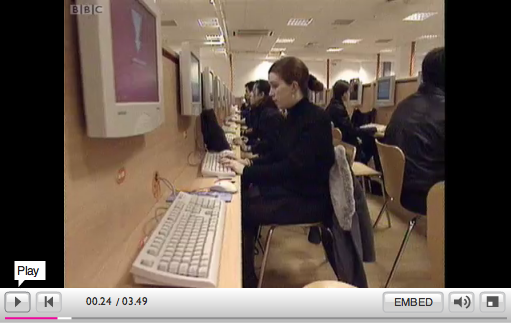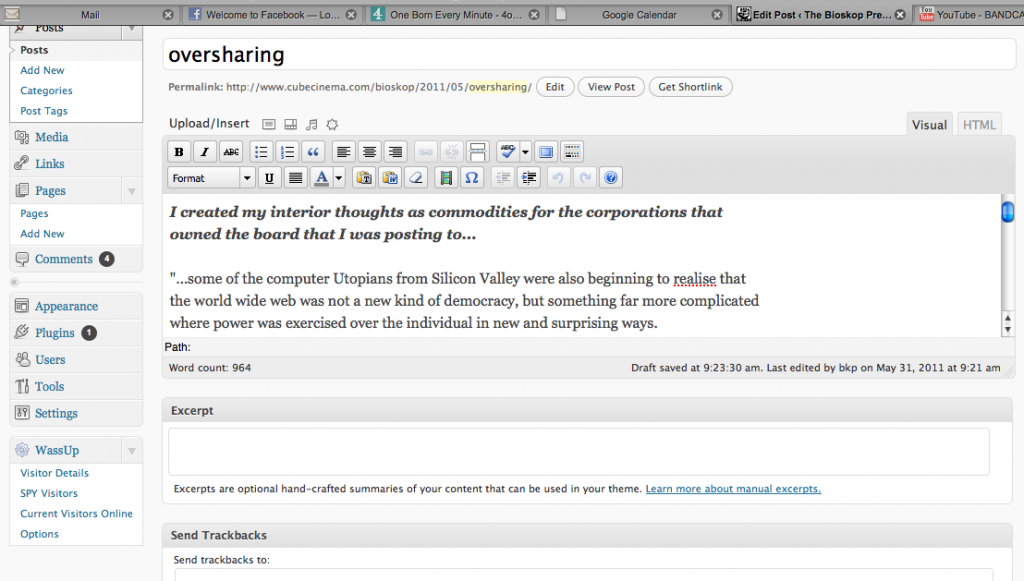I created my interior thoughts as commodities for the corporations that owned the board that I was posting to…
“…some of the computer Utopians from Silicon Valley were also beginning to realise that the world wide web was not a new kind of democracy, but something far more complicated where power was exercised over the individual in new and surprising ways.
Carmen Hermosillo had been one of the earliest believers in the new communities of cyber space, her online name was humdog and she lived on the West Coast, but then she lost faith and she posted an attack that caused a sensation online –
It is fashionable to suggest, she wrote, that cyberspace is some island of the blessed where people are free to indulge and express their individuality. This is not true. I have seen many people spill out their emotions, their guts online, and I did so myself until I began to see that I had commodified myself.
Commodification means that you turn something into a product that has a money value. In the nineteenth century commodities were made in factories by workers who were mostly exploited… but I created my interior thoughts as commodities for the corporations that owned the board that I was posting to, like Compuserve or AOL and that commodity was then sold on to other consumer entities as entertainment
Cyberspace is a black hole. It absorbs energy and personality and then re-presents it as an emotional spectacle. It is done by businesses that commodify human interaction and emotion and we are getting lost in the spectacle…”
Extract from Adam Curtis’ documentary All Watched Over by Machines of Loving Grace (nb there’s a great review here)
A vast construction whose ultimate purpose is beyond our ken
“… I understand only too well my own, almost insane compulsion to acquire more music than I could ever conceivably listen to, to the point where storing and managing it becomes a burden. What I don’t quite understand is the bloggers who hurl (in the vomitous sense of the word, almost) vast quantities of sound up on to blogs or message boards, filleting the entire discographies of artists they seem to admire and care about. You might call the syndrome “oversharing”, except that that the term already has another Web 2.0 meaning: the unguarded, minutiae-oriented self-documentation encouraged by blogging and Facebook-style social networks. In both cases, ‘too much information’ is the appropriate response.
There’s a delirious quality to the archive fever raging across the web, from YouTube to the legion of collective blogs dedicated to particular backwaters of culture or zones of sensibility. It’s like some kind of blind data-swarming drive, as if we are ants or bees building a vast construction whose ultimate purpose is beyond our ken. Which is perhaps why techno-utopians are so tempted to talk mystically about the noosphere as an emerging macro-intelligence. But another way of seeing it would be as a gigantic data dump, the collective archive as landfill.
Digitech virtually enforces this kind of activity by making it so frickin’ easy to upload and share while leaving just enough of a dopamine buzz to convince ourselves that these activities signify ‘achievement’. Thats the neurological theory of internet addiction as espoused by Nicholas Carr, author of The Shallows: What the Internet Is Doing To Our Brains.
Another explanation draws on post-Freudian psychoanalysis. Developed by Jodi Dean in Blog Theory, the core idea is that the compulsive pleasures associated with netculture –
down- and uploading, tweeting, updating, searching – engage us on a level of drive as opposed to desire.
Our transit back and forth across the net is not really in pursuit of an object of desire, but for the intransitive sensation of going. More primal and basic than desire, drive is associated with repetition and regression: it’s not the quest for the (impossible) object that will fill lack, but a kind of enactment of loss itself. Dean analyses our participation in digicultural activity in bleak dystopian terms of capture, the ensnaring of human energy. I’m not entirely convinced that desire has nothing to do with it: if you go on YouTube or comb the blogs because in the past you’ve found delicious morsels of culture-matter; there’s also a neurotic dimension rooted in the anxiety of missing out on something. But Dean’s theory does account for the addictive, kill-time aspect, the way that you can fall into a trance on the computer and the hours just fly away.
The cultural worth of Doing-It-Yourself has been voided…
Probably the most disconcerting and provocative idea in Blog Theory is the suggestion that the cultural worth of doing-it-yourself has been voided by its recuperation by digiculture’s interactivity and participatory mechanisms. When pre-formatted platforms such as Blogger and Bandcamp bring once arduous activities (producing a fanzine, self-releasing music) within the reach of anyone who can be halfway bothered, the result is an excess of access and a glut of artistic production.
Digiculture is an exact inversion of the Situationist notion of the Spectacle. That concept emerged in reaction to the mass media, with its centralized and unidirectional broadcasting. Situationists like Guy Debord critiqued entertainments that enforced passivity and isolation, and called for participatory situations that breached the barrier between art and everyday life. This in turn influenced punk and the subsequent DIY explosion of micro-labels that persists to this day. In this schema, doing-it-yourself was not just about unleashing your personal creativity: it was a political act that threw down and egalitarian challenge to the professionalized culture of media and the hierarchy of stardom. The existence of the mass media and the mainstream was what gave DIY its utopian charge: you were ‘answering back’ to the monologue of the monoculture.”
From “Excess All Areas” an essay in Wire magazine by Simon Reynolds
The bottle over the wine
Epiphany No 6: It’s all about quantity. Just like you, I’m drowning in my riches. I’ve got more music on my drives than I’ll ever be able to listen to in the next ten lifetimes. As a matter of facts, records that I’ve been craving for years (such as the complete recordings of Jean Cocteau, which we just posted on Ubu) are languishing unlistened-to. I’ll never get to them either, because I’m more interested in the hunt than I am in the prey. The minute I get something I just crave more. And so something has really changed – and I think this is the real epiphany: the ways in which culture is distributed have become profoundly more intriguing than the cultural artifact itself. What we’ve experience is an inversion of consumption, one in which we’ve come to prefer the acts of acquisition over that which we are acquiring, the bottle over the wine.
Kenneth Goldsmith – founder of UbuWeb


